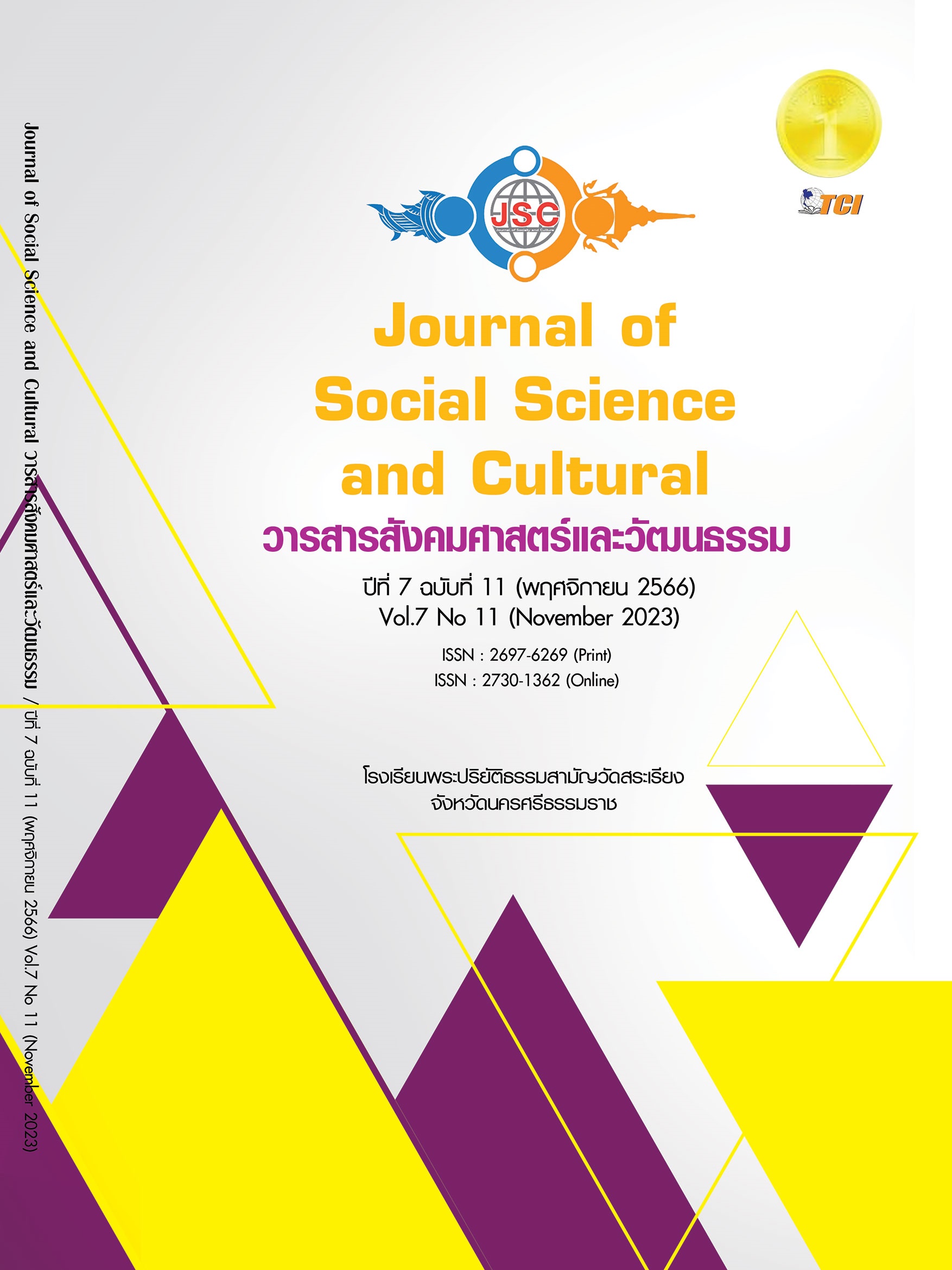A STUDY OF GROUP WORKING BEHAVIORS OF DIPLOMA IN VOCATIONAL EDUCATION STUDENTS OF PANYAPIWAT TECHNOLOGICAL COLLEGE USING PARTICIPATORY LEARNING PROCESS (PLP) FOR ORGANIZATION AND MODERN MANAGEMENT: ETHICAL REINFORCEMENT IN ORGANIZATION
Main Article Content
Abstract
The purpose of this research were to 1) study group working behavior in the Organization and Modern Management: Ethical Reinforcement in Organization using Participatory learning (PL) for students at the Diploma in Certificate level 1/1 of Panyapiwat Technology College. and 2) assess students satisfaction with the Participatory learning (PL) activities in the Organization and Modern Management: Ethical Reinforcement in Organization for students at the Diploma in Certificate level 1/1 of Panyapiwat Technology College. The research applies to action research methodology. The study was conducted on Diploma in Vocational Education students for total of 39 students at the Diploma in Certificate level 1/1 of Panyapiwat Technology College from purposive selection. Research Instrument include: Lesson plan, observation, satisfaction assessment form. Simple descriptive analysis by the mean ( ) standard deviation (S.D.) of the behavioral observation form and the satisfaction assessment form. The finding of this research showed that group working behavior using Participatory learning (PL) activities in the Organization and Modern Management: Ethical Reinforcement in Organization that changes in order from highest to lowest, namely: Students have group working behavior in cooperative working. Next is the performing tasks according to roles and responsibilities. Group Presentation, an open mind to accept the opinions of others, expressing the opinions and finally, participation to planning, respectively. For satisfaction with participatory teaching and learning in descending order, it was found that students were satisfied with the benefits they received. In particular, learning activities enhanced students to understand and get to know each other. The environmental for learning enhance students responsible for themselves and their groups. Activities that encourage students to knowledge sharing, ideas, and content that make students have a better understanding of content, respectively.
Article Details
References
ณัฐดนัย บุญหนุน และณัฐพร โชตยะกุล. (2560). ผลของการจัดการเรียนการสอนแบบมีส่วนร่วม Participatory Learning Process (PLP) เพื่อกระตุ้นให้นักศึกษาเข้าเรียนตรงเวลา. วารสารปัญญาภิวัฒน์, 9(ฉบับพิเศษ), 182-192.
พีระศักดิ์ จิ้วตั้น และอภิญญา ลิ้มสุวัฒน์. (2564). การศึกษาความคิดเห็นและความพึงพอใจการเรียนการสอนแบบมีส่วนร่วม (Active Learning) ของนักศึกษา และการปรับปรุงพัฒนาห้องเรียนอัจฉริยะ (Smart Classroom) ของมหาวิทยาลัยเทคโนโลยีสุรนารี. วารสารมนุษยศาสตร์และสังคมศาสตร์ มหาวิทยาลัยมหาสารคาม, 40(3), 65-77.
ภาริกา รุ่งพิชยพิเชฐ และณัฐพร โชตยะกุล. (2561). การลดพฤติกรรมการคุยกันในชั้นเรียนของนักศึกษาโดยประยุกต์ใช้วิธีการสอนแบบมีส่วนร่วม. วารสารปัญญาภิวัฒน์, 10(ฉบับพิเศษ), 242-250.
ศิริพร น้อยอำคา และ คณะ. (2560). กระบวนการจัดการเรียนรู้แบบมีส่วนร่วมเพื่อพัฒนาสื่อประกอบการสอนหนังสืออิเล็กทรอนิกส์: กรณีศึกษาโรงเรียนบ้านดอนจำปาดอนสวรรค์ ตำบลโพนงาม อำเภอโกสุมพิสัย จังหวัดมหาสารคาม. วารสารมนุษยศาสตร์และสังคมศาสตร์ มหาวิทยาลัยมหาสารคาม, 36(3), 120-130.
ศิริพร เพ็งจันทร์. (2560). การเรียนรู้รูปแบบโครงงานสู่การเรียนแบบมีส่วนร่วม Project Design Learning to Learners’ Participations. วารสารมหาวิทยาลัยราชภัฏยะลา, 12(2), 47-59.
ศิริพร โสมคำภา. (2561). การจัดกระบวนการเรียนรู้แบบมีส่วนร่วม ในการจัดการเรียนรายวิชาหลักการลงทุนและการวิเคราะห์หลักทรัพย์ ของนักศึกษาหลักสูตรบริหารธุรกิจบัณฑิต สาขาวิชาการเงินและการธนาคาร. ใน รายงานสืบเนื่องจากการประชุมวิชาการระดับชาติ ครั้งที่ 5. สถาบันวิจัยและพัฒนา มหาวิทยาลัยราชภัฏกำแพงเพชร.
สำนักนายกรัฐมนตรี. (2545). พระราชบัญญัติการศึกษาแห่งชาติ พ.ศ. 2542 และที่แก้ไขเพิ่มเติม (ฉบับที่ 2) พ.ศ. 2545. กรุงเทพมหานคร: บริษัท พริกหวาน กราฟฟิค.
สุทธิชัย ปัญญโรจน์. (2556). การตลาดเชิงสร้างสรรค์. วารสาร TPA News, 17(199), 43-44.
สุนันทา เลาหนันท์. (2551). การสร้างทีมงาน. กรุงเทพมหานคร: แฮนด์เมดสติกเกอร์แอนด์ดีไซน์.
สุภาวดี เที่ยงธรรม และคณะ. (2560). ผลการจัดการเรียนการสอนแบบมีส่วนร่วมวิชาปฏิบัติการพยาบาลผู้สูงอายุต่อทัศนคติต่อผู้สูงอายุของนักศึกษาพยาบาล. วารสารพยาบาลศาสตร์และสุขภาพ, 40(4), 121-133.
สุรพล พรมกุล. (2558). ศึกษาผลการจัดการเรียนรู้วิชาสัมมนาภาวะผู้นำทางการเมืองของนิสิตพุทธศาสตร์บัณฑิต สาขารัฐศาสตร์ ชั้นปีที่ 4 ในรูปแบบวิธีการเรียนการสอนแบบมีส่วนร่วม. วารสารธรรมทรรรศน์, 14(3), 103-108.


